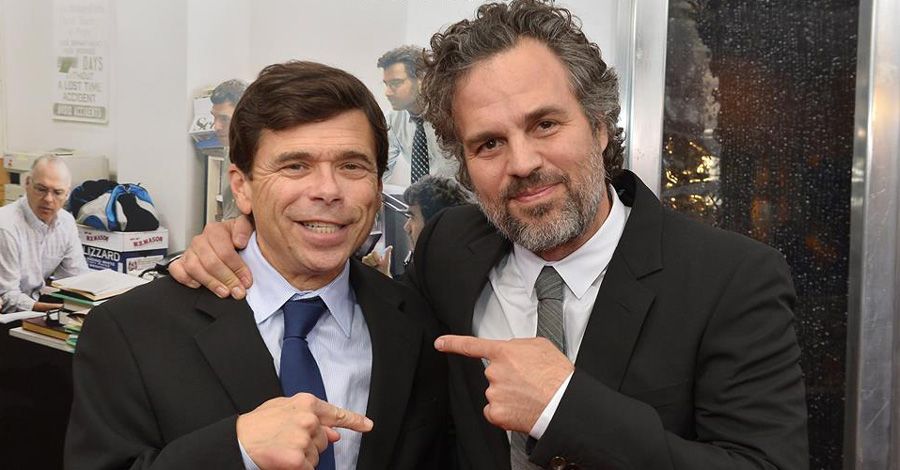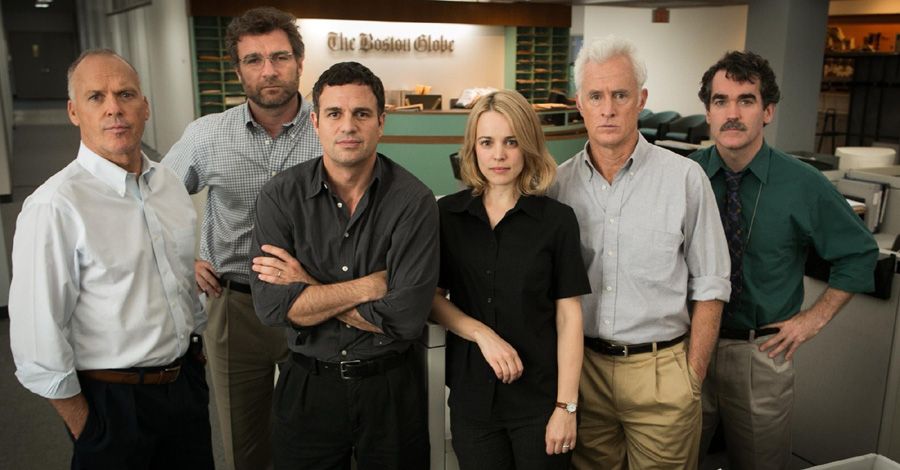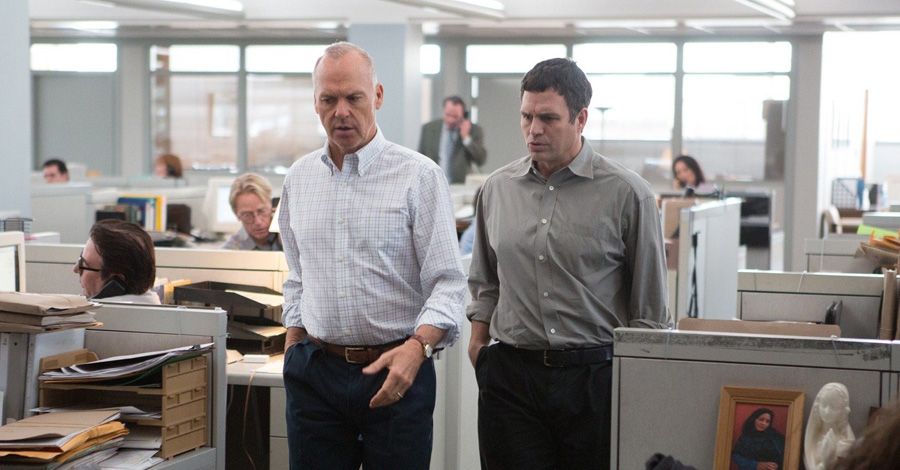Mark Ruffalo certainly has no regrets about being an actor, garnering glowing reviews and numerous awards nominations, and appearing “The Avengers,” “Iron Man 3” and “Avengers: Age of Ultron,” three of the highest-grossing films of all time. But after playing a real-life investigative reporter in "Spotlight," already topping best-of-the-year lists, he insists he’s found another vocation that could've been equally satisfying.
"I would have loved to have been a reporter," Ruffalo told SPINOFF. "I have the utmost respect. I’m just not as smart or as courageous as those guys are. They’re the real superheroes."
The film derives its title from the name of the elite journalism unit at The Boston Globe that, after long, intense and exhaustive investigation, revealed in 2002 the systematic cover-up of sexual abuse by Roman Catholic clergy within the archdiocese of Boston. The newspaper’s coverage shed a literal spotlight on the issue both in Massachusetts and around the country and earned the reporting team a Pulitzer Prize.
Ruffalo plays reporter Michael Rezendes, who did considerable and tenacious legwork on the story alongside Sacha Pfeiffer and Matt Carroll (played by Rachel McAdams and Brian d'Arcy James) under the direction of veteran editor Water "Robby" Robinson, portrayed by Michael Keaton. Directed by Todd McCarthy, the film painstakingly displays the level of commitment, tenacity and attention to detail the reporting required, as well as the fortitude to stand up to the imposing forces that wanted to see the investigation quashed.
"Journalism is one of our great institutions," Ruffalo said. "It’s the last front against tyranny. It’s the last champion of democracy. As our institutions become more entrenched and entwined with each other, journalism becomes more and more important. … I feel like this movie reminds us of why it’s important to have journalists, why it’s important to pay them, why it’s important to let them do long beat stories and why it’s important not to have them cozied up to institutions and power."
"On the other side, it’s for the victims," the actor added. "I mean, we’re talking about children who were raped, and the Catholic Church covered it up. That went all the way up to the Vatican. This story came out in the wake of 9/11, so it sort of rolled over in the shock of the nation and the world. But now is a good time for us to have this conversation. We have a church that’s dynamic right now, we have a Pope who’s ready, I think, to take these issues on, who has the courage to take them on. So I think this moment, this movie, in this time, is exactly right and perfect."
Filmmaker McCarthy said that from the start he found the story-behind-the-story fascinating. "I know Boston, I know what a type community that is," he said. "I think there was just something about the outsider, Marty Baron [played by Liev Schreiber], coming to this paper and on day one, asking some very simple, yet profound questions that literally changed the course of history. Those moments, to me – they’re few and far between. I think when you come across one, you’re really interested to kind of dig in and try to uncover what it’s all about."
McCarthy admitted working on the film affected his already pro-media mindset. "My already fully formed respect for journalists, I think, grew exponentially," he said. "They’re just impressive people. They’re not always the smartest person in the room, they just work very, very, very hard and they care a lot about the cities and towns and communities they’re reporting in. I just find that admirable, to the point of noble."
Screenwriter Josh Singer – a veteran of such TV series as "The West Wing," "Law & Order: Special Victims Unit" and "Fringe" – had previously penned the screenplay for a film chronicling the WikiLeaks scandal.
"I had just done a movie called 'The Fifth Estate,' which is also about journalism," Singer said. "We’d focused less on newspaper journalists, and more on Julian Assange, and his cohort. I hadn’t gotten to spend as much time with The Guardian guys, at least on screen. That’s sort of always bothered me because they were terrific at what they do – I hold them such high esteem. So this was a story where I got to take everything I had learned about journalism, and just tell an old-fashioned ‘This is what good local journalism is’ story, and hopefully inspire people."
Singer said that sticking close to the reality of investigative reporting initially seemed cinematically challenging. "Journalists, they don’t do anything all that exciting,” he said. “There aren’t car chases, there aren’t guns and threats. It’s a lot of waiting around and patience.” However, he quickly discovered that the stakes of the reporting can be so high, the drama becomes apparent. "If we can make that powerful, that will be really something. That was always what Tom wanted to do, and is very much what I wanted to do."
Adding to the verisimilitude of the project, the actors were all able to consult directly with their real-life reporter counterparts do dig even deeper into the reality of their roles. "Both the actors and their counterpart are just interesting people," McCarthy said. "To see them come together in the spirit of delivering the best performance, that collaboration was just exciting to witness."
Rezendes endeavored to make his on-screen alter ego Ruffalo as aware of the enormity of the sex-abuse issue and its repercussions in the communities. "I wanted to make sure, and I think we all did, that they understood how important the underlying issue was, which was the plight of survivors and victims of clergy sex abuse," he said. "We spend a lot of time talking to victims and all of their stories were so sad and devastating. We wanted to do everything we could to get to the bottom of this and to really get to the truth behind it. We really wanted the movie to express that. To our great delight, I think the movie does that."
Pfeiffer communicated to McAdams just how difficult it was to see their sources grapple with long-ago but still lingering traumas. "Talking with victims who were still kind of locked in time by something very horrific that had happened decades earlier when they were often teenagers -- that was a hard thing for us, but I think it was also motivating to make us want to work harder," she said.
The journalist was pleased at the level of everyday reality that showed up on screen. "A lot of film and TV portrayals of reporters and newsrooms are kind of stereotypes or caricatures,” she said. “I think that we wanted them to understand that it’s about the slow development about relationships. It’s about sometimes tedious work, but also, it can accomplish a lot. They really capture that, and I think they really appreciate that. "
When Keaton – a one-time journalism student himself – connected with the Spotlight editor, "he wanted to know a lot about how we did the reporting, what we were thinking, how we saw the story develop," Robinson said. "How we happened to stumble upon certain things along the way, what it felt like, what our mood was like, how things were going at home, how we were working six and seven day weeks, and how we felt when the story finally broke. He wanted to know everything."
"Emotionally, for all of us, this was kind of grueling because we spent so much time talking to adults whose lives had been ruined as children by this abuse," Robinson added. "It was pretty tough sledding at times. I have to tell you, I’m a tough, tough guy, but I did some interviews where the victims broke down and cried, and guess what, so did I."
Seeing his team's important work recreated on screen was extremely gratifying, Robinson wqie. "It’s a reminder of the importance of investigative reporting, and it’s gratifying for us because we’re portrayed by people that make us look a little better than we actually are. Tom McCarthy and Josh Singer did so much research. It’s almost like they were rerecording what we recorded. Once we saw how intent they were on finding so much out, we had a lot of faith that they really wanted to get it right. Yes, there are fictionalized scenes, but the story tracks amazingly closely to what we actually did. To include all of our internal conflicts and arguments and how we developed the documents – It’s amazing."
”Spotlight” is playing in select theaters.



